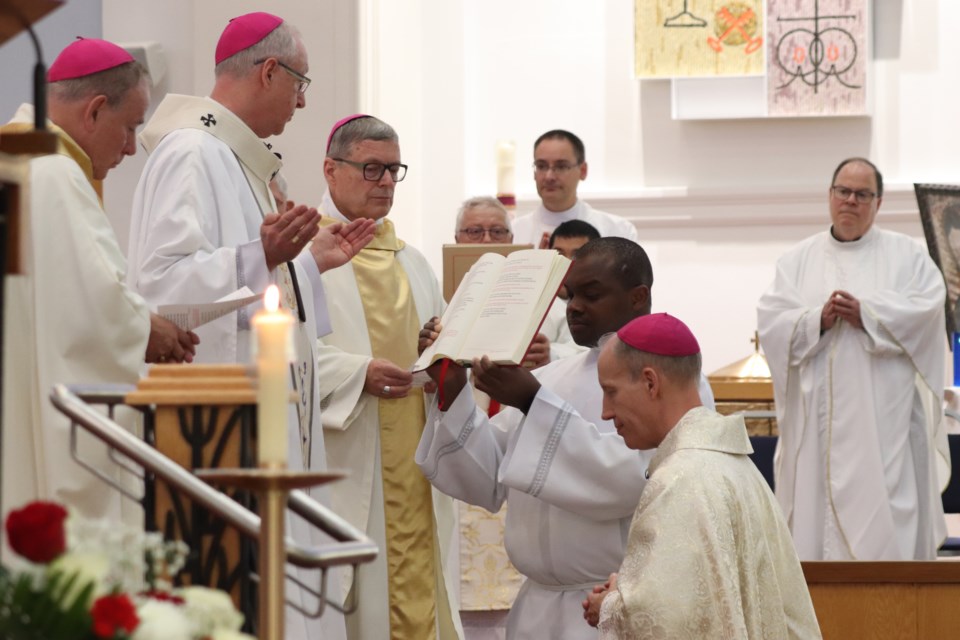LAKELAND – The Roman Catholic Diocese of St. Paul is poised to honour a significant milestone in its history as it approaches the 75th year since its founding.
The Diocese was erected from the Archdiocese of Edmonton on July 17, 1948, having finally received approval from Rome, according to long-time parishioner Denise Jalbert. Its mother church is the St. Paul Cathedral.
Since then, the Diocese has changed over the years as the population grew and traveling improved, said Jalbert.
At the beginning, the Diocese served around 20,000 parishioners. Now, the Diocese serves over 100,000 parishioners, and has 20 parishes under its wing, such as St. Michael in Elk Point, St. Louis in Bonnyville, St. Dominic in Cold Lake, St. Catherine in Lac La Biche. Also, the Diocese includes parishes as far as the St. Gabriel’s Parish in Athabasca, St. Anne’s Catholic Church in Barrhead, and two churches in Fort McMurray.
The St. Paul Diocese is one of three dioceses founded in Canada in the late 1940s and early 1950s after World War II, according to Bishop Emeritus Paul Terrio, who recently retired after serving as a bishop in the Diocese for over a decade.
It was a different culture then, he explained. The world was recovering after the war.
“The Church in Canada at the time felt a call to provide more pastoral care for Francophone Catholics outside Quebec.” Thus, the founding of the three dioceses. St. Paul Diocese, the Diocese of Yarmouth in Nova Scotia, and the Diocese of Gravelbourg in Saskatchewan.
Terrio echoed Jalbert, in that since the Diocese’s inception, evolving with demographic changes and social developments, it still functions as a separate diocesan pastoral entity. “The fact that the Diocese of St. Paul has continued on and even flourished is significant,” he said.
“The greatest significance, of course, is what God does in the hearts and the lives of all the people,” throughout the Diocese in the last 75 years.
When asked how he hopes to see the Diocese move forward in the next 75 years, Terrio said churches are God’s action in the world. “It’s His initiatives that inspire us and work through us... and I would hope and pray that He will continue.”
He added that he also hopes that Catholic families would grow a stronger faith in God, “and that we will all be responsive to the call of the universal Church to share the faith... because we are a very secularized world.” He also hopes anybody who is a follower of Jesus Christ, to continue sharing their faith with people around them in a “gentle, fraternal way.”
Bishop Gary Franken, St. Paul Diocese’s bishop, who took on the role after his Episcopal Ordination in December last year, said he also hopes the disciples of the Lord to reach out to others and share their faith, “inviting them to that same gift.”
Ultimately, the anniversary is an opportunity to give thanks for the blessings of the Lord, and “how we can share those blessings with even more people” in the more years to come. Franken said there will be challenges with how the Diocese will move forward, such as the changing demographics in rural Alberta, but he sees this also as an opportunity.
According to Franken, the celebration will begin with the blessing of the 75th anniversary monument “Come To The Well” at the Maria Pastoral Centre, designed and built by St. Paul-based artist Eric Spoeth.
“Come To The Well” is a scriptural statement referring to God, as Father, Son, and Spirit, said Franken. “The Old Testament speaks of God being the cistern of water that people turn to for their life.”
Then, St. Paul Cathedral will have a Holy Mass following the blessing of the monument. After the Mass, refreshments will be served at the St. Paul Seniors Citizen Centre, located just behind the Cathedral.



